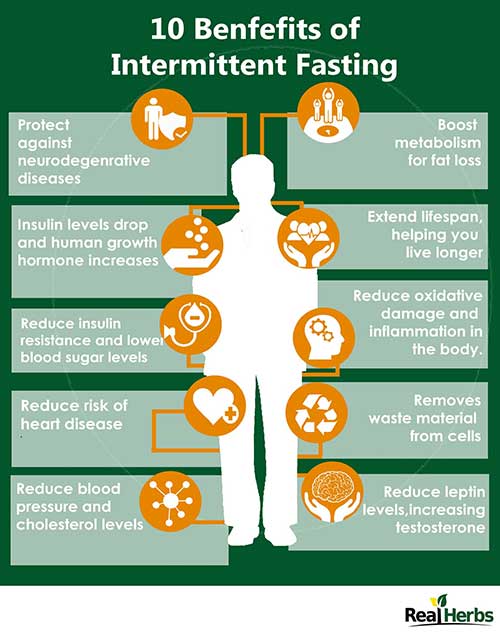 Does intermittent fasting really work? Nobody likes to have an empty belly, so the fact that intermittent fasting has become so popular in recent years could be seen as being somewhat surprising.
Does intermittent fasting really work? Nobody likes to have an empty belly, so the fact that intermittent fasting has become so popular in recent years could be seen as being somewhat surprising.
However, the system has something going for it that other diet plans do not—it’s a relatively simple diet to follow.
Think about it. If you were following a high protein diet, you would need to search out high protein foods and eat them the majority of the time. If you opted for the cabbage soup diet you would need to keep stocked up with cabbage and eat it a lot.
You would also have to really like cabbage, of course, and even if you did at the start of the diet you would likely be sick to the back teeth of it after a day or three of cabbage soup.
Intermittent fasting would require you to cut your food intake down severely on certain days of the week, but you could eat normally the rest of the time.
Intermittent Fasting Variations
Nope! Intermittent fasting does not have to be the same for everyone. It’s an umbrella term used to describe any form of eating pattern that involves cycled fast periods. Although there are any number of variations to choose from, for the purpose of this article we’ll stick to just four.
Alternate-Day Modified Fasting
This type of intermittent fasting can take different forms:
- Eat normally for 12 hours and then fast for 36 hours
- Eat normally for 24 hours and then fast for 24 hours
- Eat normally for 24 hours and then eat no more than 500 calories throughout the following 24 hours.
Eat-Stop-Eat
The eat-stop-eat fasting method involves regular 24-hour fast periods where little or no food is allowed. The amount of non fast days per week can vary, but many people choose to eat for five days and fast for two (5:2 Diet). The singer, Beyonce, is believed to be a fan of the 5:2 Diet, so anyone who does try it is in good company, and it’s often thought to be so effective it has also become known as the “Fast Diet”.
Random Meal Skipping
This is a nice easy option and does not require the same level of commitment as other forms of intermittent fasting. The name says it all. You pick random meals throughout the week and then skip them.
Feeding Window
This is also one of the easier fasting methods. Its just a case of selecting a set period of time and making it your official “feeding window” (8am to 4pm, 12pm to 8pm, etc.).

Can Intermittent Fasting Really Assist Weight Loss?
The good news is, intermittent fasting has proven to be an effective way to lose weight.
The bad news is, not everyone experiences the same level of success. The fact that this type of fasting appears to work better for some people than others could be due to the food choices people make when they are not fasting. Using two studies as an example. Both studies used the random meal skipping diet plan.
 The people involved in study no. 1 skipped breakfast and lost weight.
The people involved in study no. 1 skipped breakfast and lost weight.
The participants in study no. 2 skipped breakfast and didn’t lose weight.
The people involved in both studies were allowed to eat freely for the rest of the day, so it seems likely the people involved in study no. 1 made healthier food choices and/or consumed less calories per day than the participants in study no. 2.
Most people find it hard to lose weight, but the mathematics of weight loss are incredibly simple.
If you regularly eat less calories than your body burns you will lose weight.
Some people achieve this my eating less in general and supplementing their efforts with regular exercise and/or a quality diet pill.
Others prefer to use the intermittent fasting technique but, either way, the importance of making healthy food choices is paramount.
Intermittent Fasting and the Health
The benefits and pitfalls of intermittent fasting require further research, but some studies show eating in this way may benefit the health in other ways and there are even people who believe this kind of restricted eating pattern may lead to a longer life.
That’s a claim that has never been proven, but there is some evidence to suggest intermittent fasting could help delay the ageing process and offer protection against heart disease, cancer, and diabetes. Needless to say, further study is needed.
Other Notable Considerations
Intermittent fasting should never be attempted by women who are pregnant or by people who have diabetes or certain other existing health problems.
Anyone with health issues should always ask their doctor’s advice before systematically starving themselves for short periods of time in this way.
It is also important that prospective intermittent fasters be aware fasting can cause headaches, stress, dehydration, constipation, diarrhoea, or a number of other unpleasant reactions.
The Bottom Line
Although intermittent fasting is a viable weight loss option, people can lose weight just as efficiently by cutting out snacking and using the “eat smaller meals” approach.
If you are someone who finds it easier to eat less often than to eat less food more often, intermittent fasting could be worth a go.
But there are likely to be a lot of hungry moments involved. You may also feel quite weak and dizzy during your fast periods so, if your work involves driving or operating machinery, you may want to restrict your fasts to your non-work days or chose another way to lose weight instead.
Which appetite suppressants are most likely to work – click here to find out
